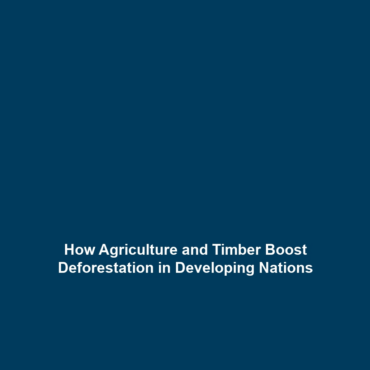Economic Reliance on Agriculture, Timber, and Extractive Industries Drives Deforestation in Developing Countries
Introduction: Economic reliance on agriculture, timber, and extractive industries has increasingly become a driving force behind deforestation, particularly in developing countries. This phenomenon significantly contributes to biodiversity loss, affecting ecosystems and species diversity globally. Understanding the intricate link between economic activities and forest depletion is essential, as this impacts environmental sustainability, local communities, and global climate change efforts. This article delves into how these sectors influence deforestation and highlights the risks associated with neglecting biodiversity loss.
Key Concepts
Understanding Deforestation and Biodiversity Loss
The economic systems in developing countries often prioritize short-term growth through agriculture, timber extraction, and mining. As these industries expand, they encroach upon vast forested areas, leading to significant habitat destruction. Key concepts include:
- Agricultural Expansion: Intensive farming practices require vast land, prompting deforestation to meet demand for food and cash crops.
- Timber Production: Sustainable timber practices are often overlooked due to economic pressures, leading to illegal logging and forest degradation.
- Extractive Industries: Mining and oil extraction necessitate the removal of large forested areas, further exacerbating biodiversity loss.
Applications and Real-World Uses
Understanding how economic reliance on agriculture, timber, and extractive industries drives deforestation can yield practical solutions for sustainability. Some applications include:
- Sustainable Agriculture: Implementing agroforestry practices to enhance both crop yields and forest conservation.
- Timber Certification: Promoting responsible logging through certification programs (e.g., FSC) to reduce illegal practices.
- Responsible Mining Initiatives: Developing strategies that minimize ecosystem damage and improve biodiversity conservation.
Current Challenges
Despite the available knowledge, there are numerous challenges when addressing how economic reliance on agriculture, timber, and extractive industries drives deforestation:
- Lack of effective regulatory frameworks in many developing countries.
- Economic pressures overshadowing environmental considerations.
- Insufficient funding for sustainable practices and conservation initiatives.
- Limited awareness among local communities about the importance of biodiversity.
Future Research and Innovations
The future of addressing deforestation through economic reliance requires rigorous research and innovative solutions. Promising areas of focus include:
- Remote Sensing Technologies: Employing satellite imagery and drones for monitoring forest cover changes.
- Agroecological Approaches: Researching integrated agricultural systems to promote biodiversity while ensuring food security.
- Decoupling Economic Growth from Deforestation: Exploring new economic models that prioritize environmental health alongside development.
Conclusion
In conclusion, the economic reliance on agriculture, timber, and extractive industries significantly drives deforestation, particularly in developing countries, leading to alarming rates of biodiversity loss. Addressing this complex issue requires a multifaceted approach involving sustainable practices, awareness campaigns, and innovative technologies. Stakeholders must prioritize protecting forests to ensure ecological balance and foster a sustainable future for all. For further reading on related topics, explore our articles on sustainable agriculture and forest conservation strategies.
